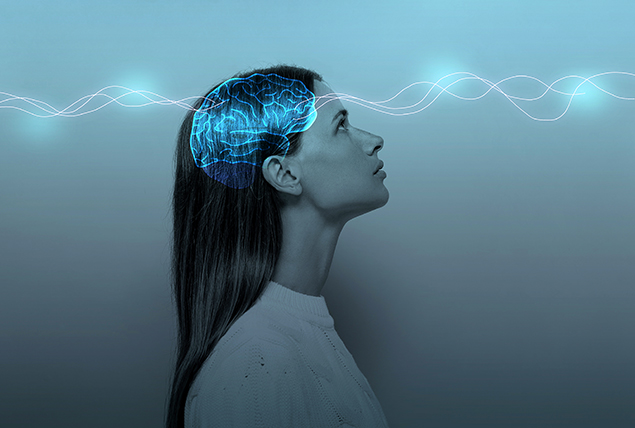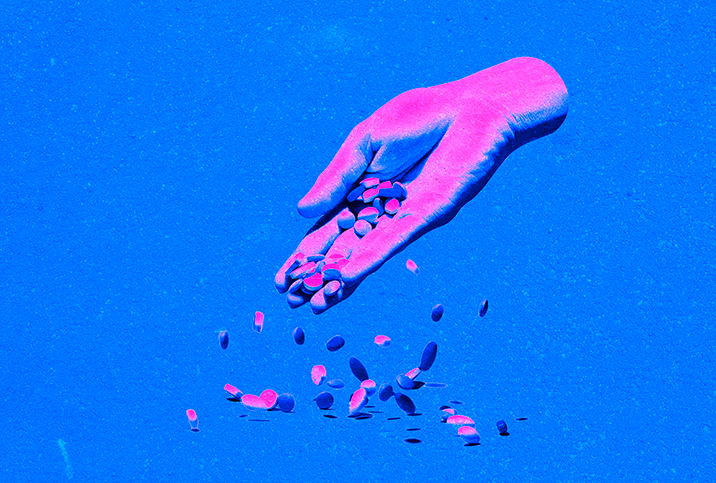Serotonin Deficiency Does Not Cause Depression

Depression is a mental thief that can steal joy, hope, motivation and, in worst-case scenarios, the will to live. For decades, doctors and pharmaceutical companies have implicated serotonin deficiency as depression's primary cause, pushing serotonin-modulating medications as a first-line treatment. And yet the evidence in support of the so-called serotonin hypothesis—or the efficacy of serotonin-modulating drugs—is paltry, at best.
A recent systematic review of 17 previous studies and meta-analyses linking serotonin and depression underscores the fact.
Led by researchers at University College London and published in July 2022 in Molecular Psychiatry, the review included multiple branches of serotonin research and encompassed tens of thousands of participants. Ultimately, the authors found "no consistent evidence" of an association between serotonin and depression, and no support for low serotonin activity or concentrations causing depression.
In addition to discrediting a long-held hypothesis, the authors suggested the findings raise questions about how selective serotonin reuptake inhibitors (SSRIs)—the most popular class of antidepressants—actually work.
Though SSRIs exert some positive effects for some people, ample evidence suggests they are not effective in treating many symptoms of depression, let alone addressing its cause. The medications, which increase serotonin levels in the brain, can have a slew of unpleasant side effects, including those with lasting sexual health implications.
Where did the serotonin hypothesis come from?
Serotonin is a monoamine neurotransmitter, a chemical that the body produces naturally. It has many functions, such as modulating mood, cognition, reward, learning and memory.
Researchers hypothesized that monoamine imbalances may contribute to a diagnosis of depression starting in the 1950s, when they recognized the neurotransmitters were involved in the effects of lysergic acid diethylamide (LSD). At the time, LSD was regarded as a novel drug with potential psychiatric benefits.
Then, in the 1960s, the serotonin hypothesis emerged from that broader theory, prompting the development of selective serotonin reuptake inhibitors.
The first SSRI came out in the 1980s but was quickly taken off the market due to adverse side effects and toxicity. Prozac, one of the most popular SSRIs, came about not long after, along with an enticing and well-funded marketing campaign.
"The explosion of popular literature in the 1990s offered prescriber and client testimonials that SSRIs worked with vivid details that would help other people believe the drugs themselves worked," explained Stephen Benning, Ph.D., director of the Psychophysiology of Emotion and Personality Laboratory at the University of Nevada, Las Vegas.
"Because these clinical anecdotes were not placebo-controlled, the large placebo response would seem to be a drug effect to all the people who both prescribed the drugs and took them," he added. "These anecdotes have much more visceral staying power than relatively dry scientific reanalyses of data that show there is moderate to high certainty that there is no difference between patients with depression and controls in their serotonin metabolite levels, and no association between the differences in the serotonin [reuptake] transporter gene and depression symptoms."
The question is do SSRIs work?
Research indicates SSRIs can help some people with moderate or severe depression to a certain degree. It's the mechanism by which they work—and how effective they are—that's highly contested.
Part of the difficulty in evaluating their efficacy is that depression encompasses various symptoms that can vary significantly from one person to another.
Hans Eriksson, M.D., chief medical officer at HMNC Brain Health, with offices in New York City and Munich, said some symptoms are typical, such as depressed mood, sadness and the inability to experience pleasure. But some people experience insomnia, while others sleep too much; some overeat, while others have no appetite; and not every depressed person experiences thoughts of self-harm or suicide, though some do. Additionally, individual symptoms might dissipate or intensify at different rates over time.
"You could actually have two patients that only share one symptom and still fulfill the criteria for depression, so that's in itself problematic, that depression is so multifaceted," Eriksson said. "It's a much more complex diagnosis than many other psychiatric and somatic diagnoses."
Given the vast array of symptoms and how depression is quantified, people might technically improve even if the drug doesn't address the root cause of their disorder.
"Taking SSRIs does produce improvement in clinical symptoms of depression," Benning noted. "However, people's expectations about getting better account for a large amount of that effect, which reflects the placebo effect. In particular, when people take an active placebo that mimics the side effects of an antidepressant, the improvement in their depressive symptoms is not discernibly different from such improvement when they take an SSRI. This placebo effect seems to have increased over time—specifically, for clinicians' ratings of depression—as the benefits of SSRIs became increasingly touted in providers' offices and the clinical literature."
Joanna Moncrieff, M.D., professor of psychiatry at University College London and the 2022 review's lead author, agrees, explaining that the amplified placebo effect is probably the primary way in which antidepressants can sometimes yield positive results. She added that some people in intense distress might perceive the drug's emotional blunting effect as helpful.
"We've come a long way in terms of safety for the antidepressant medications, but on the efficacy side, there hasn't been so much development during the last 60 years," Eriksson said.
Moncrieff noted that some critics have argued it doesn't matter how antidepressants work, implying that while it might not be serotonin, it's likely something similar. However, she added there's no convincing evidence.
"It's very misleading to suggest that these drugs work by targeting the underlying biological mechanism of depression, because we really do not know what that is," she said. "If you think an antidepressant might work through a placebo effect or a slight numbing effect, that's a very different proposal from it working through correcting an underlying abnormality. If antidepressants are not correcting an underlying serotonin abnormality but they are changing brain chemistry in some way, we have to acknowledge they're changing our normal brain chemistry, and that is often not a good idea. That could have some long-term complications and be harmful."
The downside of SSRIs
For some people, the potential benefit of SSRIs overshadows questions of efficacy. But Moncrieff and others stress the importance of weighing risks, as these medications can produce serious, sometimes permanent side effects, including emotional numbing and withdrawals, medically known as antidepressant discontinuation syndrome. This syndrome, which can produce severe and even debilitating symptoms, typically arises when a person stops the medication "cold turkey," one of many reasons to discuss medication management with a doctor.
Another prevalent side effect—and prominent depression symptom—is sexual dysfunction, the most common being a loss of libido, which is one reason SSRIs are prescribed to sex offenders, according to Cochrane, a healthcare information resource. Other side effects include difficulty climaxing and genital numbing.
For most people, sexual side effects dissipate when they stop taking the medication. For others, they persist indefinitely. Considering sex and sexuality's influence on physical and mental health, these effects could significantly impact a person's long-term quality of life.
"Obviously, sexual relationships are important," Moncrieff said. "Sex is what enables us to get really close to other people and fulfill that need for intimacy. It's part of what it is to be an adult, a human being, the ability to be sexual. I think for most people, their identity as a sexual being is an important part of their personality and who they are. I think suppressing our sexuality changes us and, probably for most of us, makes us less whole, less fulfilled than we would be otherwise, though I accept there are some people that may not feel that's important."
Moncrieff said it's unclear why these effects persist, though serotonin is known to decrease sexual function.
"There's fairly good evidence serotonin is involved in our sexual response and that it generally inhibits sexual activity," she said. "It seems that the use of SSRIs is really setting our sexual clock, our sexual drivers in some way that may be long-lasting."
There might be better treatments
Moncrieff said the serotonin hypothesis has persisted because it's attractive and simple. It's much more manageable than grappling with the overwhelming idea that depression is likely caused by multiple factors, some of which have no biological underpinning.
Rather than investing more money into investigating potential biological causes of depression, Moncrieff hopes her research and others' will prompt the medical community and broader society to change the way they view depression and its treatment.
"I think the problem is in thinking of depression as a thing that can be caused," Moncrieff said. "Depression is a state of human beings. It's an emotional reaction to things that are going on around them."
In addition to experiences such as abuse, neglect, loss, poverty and loneliness contributing to depression, Moncrieff said a person's emotional tendencies—part of their personality, which is also informed by experiences—play a role, too. Genes may also factor in, although her research did not find any genetic differences in people with depression and those without. Benning, Eriksson and others suggest neuroplasticity may be involved as well.
Ultimately, most experts agree depression is an emotional state that arises and presents for myriad reasons in various ways. Because of this, its treatment must be individualized and often consists of a mixture of therapies and lifestyle changes.
"The most effective depression treatment is to resolve what has made the person depressed, whatever that is," Moncrieff explained. "Obviously, that's going to be different for each person."
She said exercise has been shown to be equally effective or better than antidepressants, while mindfulness, cognitive behavioral therapy (CBT) and various other forms of therapy also have demonstrated long-term benefits.


















